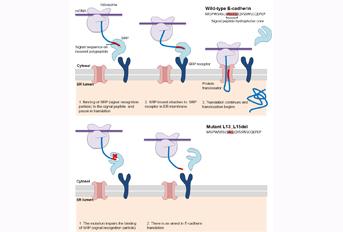Associação Portuguesa de Investigação em Cancro
New molecular mechanism to explain cases of hereditary gastric cancer
New molecular mechanism to explain cases of hereditary gastric cancer

The most common cause of Hereditary Diffuse Gastric Cancer are germline mutations of the CDH1 gene. The vast majority of CDH1 germline alterations lead to truncated forms of E-cadherin with loss of protein function.
E-cadherin is a key adhesion molecule encompassing an extracellular domain responsible for the homophilic binding to cadherins presented on neighbouring cells, a transmembrane domain, and a cytoplasmic portion that supports the anchorage to the cytoskeleton. Importantly, before protein processing, the immature molecule also encompasses a short signal peptide that is crucial for translation and translocation of membrane proteins. Despite the remarkable biological function of signal peptides, genetic changes occurring in this region are usually disregard by the clinical geneticists since E-cadherin signal peptide is cleaved upon translocation to the endoplasmic reticulum and is not be part of the mature protein.
The interesting aspect and original point of this discovery is that it provides the first evidence that the integrity of the signal peptide hydrophobic core is fundamental for the progress of E-cadherin synthesis and delivery, and the failure in this checkpoint leads to loss of protein expression and function, and ultimately to disease. I this work, the authors evaluated the functional impact of the p.L13_L15del variant found in a HDGC family from New Zeeland and verified that this mutant cadherin impairs the binding of cellular components crucial for protein translation and subsequent translocation into the endoplasmic reticulum.
Overall, the team described a new molecular mechanism involved in the disruption of a tumour suppressor gene associated with hereditary cancer.
Authors and Affiliations:
Joana Figueiredo1,2#, Soraia Melo1,2,3#, Kimberley Gamet4, Tanis Godwin5, Susana Seixas1,2, João M. Sanches6, Parry Guilford5, Raquel Seruca1,2,3
1 Instituto de Investigação e Inovação em Saúde (i3S), Porto, Portugal;
2 Institute of Molecular Pathology and Immunology of the University of Porto (IPATIMUP), Porto, Portugal;
3 Medical Faculty of the University of Porto, Porto, Portugal;
4 Genetic Health Service NZ, Auckland City Hospital, Auckland, New Zealand;
5 Cancer Genetics Laboratory, Centre for Translational Cancer Research (Te Aho Matatū), Department of Biochemistry, University of Otago, Dunedin, New Zealand;
6 Institute for Systems and Robotics, Instituto Superior Técnico, Lisboa, Portugal.
# These authors have equal contribution to the work
Abstract:
The aim of this study was to uncover the pathogenic relevance and the underlying molecular mechanism of a novel CDH1 variant found in a Hereditary Diffuse Gastric Cancer family (p.L13_L15del), which affects the signal peptide of E-cadherin without changing the remaining predicted sequence. We verified that p.L13_L15del cells yield low levels of E-cadherin, decreased cell adhesion and enhanced cell invasion. Further, we demonstrated that the disruption of the highly conserved hydrophobic core of the signal peptide hampers the binding of cellular components crucial for E-cadherin translation and translocation into the endoplasmic reticulum, constituting a new molecular basis for the loss of a tumour suppressor gene causative of hereditary cancer.
Journal: Molecular Cancer
Link: https://molecular-cancer.biomedcentral.com/articles/10.1186/s12943-018-0859-0




